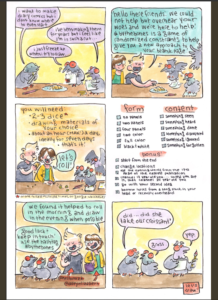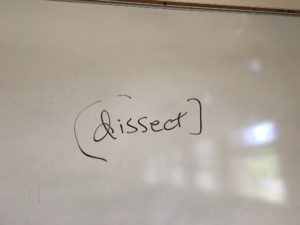I’ve been thinking about some of thoughtful responses and building-upons that emerged from the write-your-own-abecedarian poem exercise. At some level, that exercise was about both freedom and (some) constraint.

I’m sharing this graphic with you, which @hellomizk describes as follows:
#bythebones is a game of randomized constraints for anybody who wants to play with diary comics–whether you’ve been making them for years or have never tried but want to give it a go. Here are the instructions: please share widely and let’s draw!
h/t @savannahmillion, who along with @alexcox hosts Roboism, a podcast about how “robots, artificial intelligence, and machine learning are affecting our culture.”

